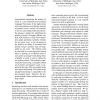Free Online Productivity Tools
i2Speak
i2Symbol
i2OCR
iTex2Img
iWeb2Print
iWeb2Shot
i2Type
iPdf2Split
iPdf2Merge
i2Bopomofo
i2Arabic
i2Style
i2Image
i2PDF
iLatex2Rtf
Sci2ools
116
click to vote
ACL
2010
2010
Identifying Text Polarity Using Random Walks
Automatically identifying the polarity of words is a very important task in Natural Language Processing. It has applications in text classification, text filtering, analysis of product review, analysis of responses to surveys, and mining online discussions. We propose a method for identifying the polarity of words. We apply a Markov random walk model to a large word relatedness graph, producing a polarity estimate for any given word. A key advantage of the model is its ability to accurately and quickly assign a polarity sign and magnitude to any word. The method could be used both in a semi-supervised setting where a training set of labeled words is used, and in an unsupervised setting where a handful of seeds is used to define the two polarity classes. The method is experimentally tested using a manually labeled set of positive and negative words. It outperforms the state of the art methods in the semi-supervised setting. The results in the unsupervised setting is comparable to the b...
ACL 2010 | Computational Linguistics | Natural Language Processing | Polarity Estimate | Word Relatedness Graph |
Related Content
| Added | 10 Feb 2011 |
| Updated | 10 Feb 2011 |
| Type | Journal |
| Year | 2010 |
| Where | ACL |
| Authors | Ahmed Hassan, Dragomir R. Radev |
Comments (0)

